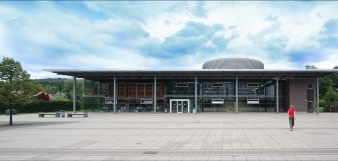Dissolution of UPP
Grundsätzlich schützt die Verfassung von Südkorea das Recht, eine Partei zu gründen und zu unterhalten.
| Article 1 (1) The Republic of Korea shall be a democratic republic. (2) The sovereignty of the Republic of Korea shall reside in the people, and all state authority shall emanate from the people. |
| Article 4 The Republic of Korea shall seek unification and shall formulate and carry out a policy of peaceful unification based on the basic free and democratic order. |
| Article 8 (1) The establishment of political parties shall be free, and the plural party system shall be guaranteed. (2) Political parties shall be democratic in their objectives, organization and activities . . . . (3) Political parties shall enjoy the protection of the State . . . . (4) If the purposes or activities of a political party are contrary to the fundamental democratic order, the Government may bring an action against it in the Constitutional Court for its dissolution, and the political party shall be dissolved in accordance with the decision of the Constitutional Court. |
Eine Partei in Südkorea ist die UPP (Unified Progressive Party). Sie wurde 2011 gegründet, hatte ca. 100.000 Mitglieder und hatte 2013 5 Sitze in der National Assembly.
Im Jahr 2013 wurden auf Anordnung des Präsidenten die Wohnungen und Büros der zehn führenden Mitglieder dieser Partei vom National Intelligence Service (NIS) durchsucht. Unter den führenden Mitgliedern war auch Lee Seok-ki, ein National Assembly Mitglied, der die UPP vertreten hat. Lee wurde angeklagt wegen Vergehen (unter anderem, dass er einen Aufstand gegen den Staat herbeiführen wollte, mit dem Feind, also Nordkorea zusammengearbeitet hat und Nordkorea gelobpreist hat und dass er Material besessen hat, dass dem Feind, also Nordkorea, dabei geholfen hat gegen das National Security Law zu verstößen). Sechs andere Mitglieder dieser Partei wurden wegen ähnlichen Vergehen angeklagt. Die Staatsanwälte haben behauptet, dass Lee Seok-ki einer geheimen Organisation angehört (namens Revolutionary Organization), die zusammen mit der UPP die Regierung von Südkorea umstürzen will und sie mit einem „Progressive Democratic Regime“ (ein Regime ähnlich wie Nordkorea) ersetzen will. Die Anschuldigungen beruhen auf ein Protokoll eines einzigen Treffens von 130 Partei-Mitgliedern.
Hier ist die Hauptanschuldigung:
| 1. "Plotting insurgency" Lee issued the three guidelines for war :
a. Build a solidarity organization for emergency as soon as possible.
b. Perform a large-scale propaganda using a crowd of people just like the time when "the Mad Cow Disease riot" hit the nation.
c. Gather information on military facilities such as U.S. Army camps, U.S. radar bases, and power plants. He made a . . . that they should resolve to make ideological and physical preparation; strengthen security against white terror and preventive custody; and wage an unconventional partisan war in the rear.
a. Along with other members of the organization, singing "the song for comrades of revolution."
b. Possessing materials for "benefiting" the enemy: 90 original North Korean contents including a CD of "the works of the great general Kim Jung-il"; 15 North Korean movies ; 30 North Korean novels; 27 materials written by pro-North organization and people; and 28 other works.
|
Das Urteil der ersten Verhandlung:
Das Suwon District Court hat Lee für schuldig erklärt. Er habe gegen den National Security Act verstoßen. Er wurde zu 12 Jahren Gefängnis verurteilt.
Das Urteil des Berufungsgerichts:
Die Gefängnisstrafe wurde auf 9 Jahre herabgesetzt.
Im November 2013 hat Präsident Park Gung Hee einen Antrag an das Constitutional Court zur Auflösung der UPP gestellt.
| Im Januar 2015 hat das Constitutional Court mit 8 zu 1 für die Auflösung der Partei gestimmt. The Constitutional Court found fault with “progressive democracy,” as expressed in the UPP’s platform, and ruled that progressive democracy coincided with North Korea’s aim of fomenting revolution in the South. The court also upheld the government’s charge that the UPP aims to install a socialist government through violent means |
Grundsätzlich können Parteien nicht einfach aufgelöst werden, da es zu den Grundrechten zählt, eine Partei zu gründen und zu unterhalten. Jedoch gibt es Grenzen. Verstößt die Partei gegen die grundsätzliche demokratische Ordnung, so kann sie in Südkorea aufgelöst werden. Hier ist es jedoch schwierig zu definieren, wann eine Partei gegen die grundsätzliche demokratische Ordnung verstößt. Hier liegt es an den Richter des Constitutional Courts, die Entscheidung zu treffen.
Diese Seite wurde noch nicht kommentiert.





